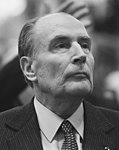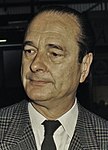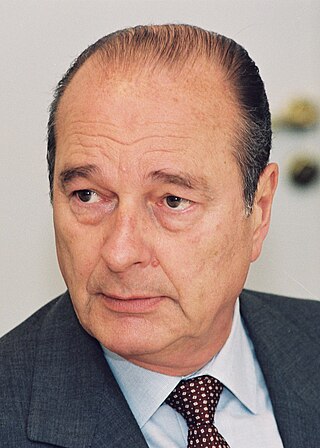
Jacques René Chirac was a French politician who served as President of France from 1995 to 2007. Chirac was previously Prime Minister of France from 1974 to 1976 and from 1986 to 1988, as well as Mayor of Paris from 1977 to 1995.

France is characterised by numerous political trends. This article provides an overview of some of them.

Michel Rocard was a French politician and a member of the Socialist Party (PS). He served as Prime Minister under François Mitterrand from 1988 to 1991 during which he created the Revenu minimum d'insertion (RMI), a social minimum welfare program for indigents, and achieved the Matignon Accords regarding the status of New Caledonia. He was a member of the European Parliament, and was strongly involved in European policies until 2009. In 2007, he joined a Commission under the authority of Nicolas Sarkozy's Minister of Education, Xavier Darcos.

The Rally for the Republic, was a Gaullist and conservative political party in France. Originating from the Union of Democrats for the Republic (UDR), it was founded by Jacques Chirac in 1976 and presented itself as the heir of Gaullist politics. On 21 September 2002, the RPR was merged into the Union for the Presidential Majority, later renamed the Union for a Popular Movement (UMP).

The Union for French Democracy was a centre-right political party in France. The UDF was founded in 1978 as an electoral alliance to support President Valéry Giscard d'Estaing in order to counterbalance the Gaullist preponderance over the political right in France. This name was chosen due to the title of Giscard d'Estaing's 1976 book, Démocratie française.
In France, the term Gaullist Party is usually used to refer to the largest party professing to be Gaullist. Gaullism claims to transcend the left–right divide in a similar way to populist republican parties elsewhere such as Fianna Fáil in Republic of Ireland, the Justicialist Party in Argentina, and the African National Congress in South Africa.

Édouard Balladur is a French politician who served as Prime Minister of France under François Mitterrand from 29 March 1993 to 17 May 1995. He unsuccessfully ran for president in the 1995 French presidential election, coming in third place.

Presidential elections were held in France on 23 April, with a second round on 7 May.
Cohabitation is a system of divided government that occurs in semi-presidential systems, such as France, whenever the president is from a different political party than the majority of the members of parliament. It occurs because such a system forces the president to name a premier who will be acceptable to the majority party within parliament. Thus, cohabitation occurs because of the duality of the executive: an independently elected president and a prime minister who must be acceptable both to the president and to the legislature.
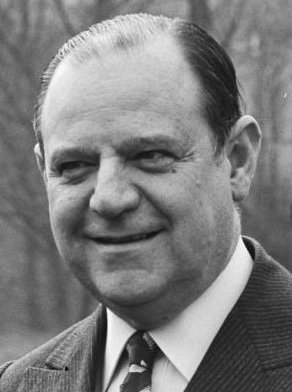
Raymond Octave Joseph Barre was a French centre-right politician and economist. He was a Vice President of the European Commission and Commissioner for Economic and Financial Affairs under three presidents and later served as Prime Minister under Valéry Giscard d'Estaing from 1976 until 1981. As a candidate for the presidency in 1988, he came in third and was eliminated in the first round. He was born in Saint-Denis, on the French island of Réunion, and then still a colony.

Presidential elections were held in France on 26 April 1981, with a second round on 10 May. François Mitterrand defeated incumbent president, Valery Giscard d'Estaing to become the first Socialist president of the Fifth Republic. It is the first presidential election in French history that an incumbent President actively seeking reelection is denied a second term.
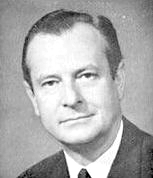
Jean Adrien François Lecanuet was a French centrist politician.

French legislative elections took place on 21 and 28 March 1993 to elect the tenth National Assembly of the Fifth Republic.

French legislative elections took place on 5 and 12 June 1988, to elect the ninth National Assembly of the Fifth Republic, one month after the re-election of François Mitterrand as President of France.
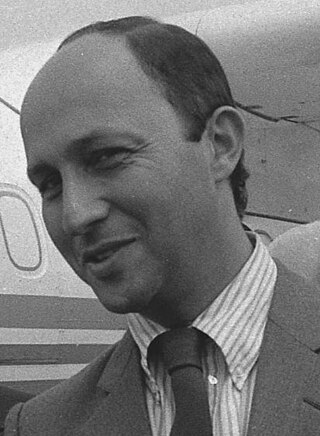
The French legislative elections took place on 16 March 1986 to elect the eighth National Assembly of the Fifth Republic. Contrary to other legislative elections of the Fifth Republic, the electoral system used was that of party-list proportional representation.
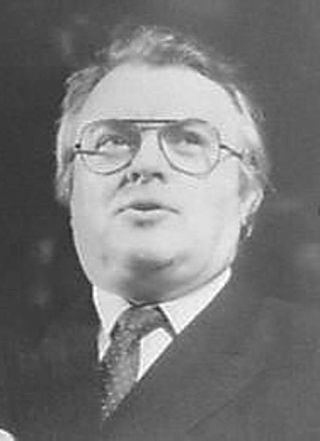
French legislative elections took place on 14 June and 21 June 1981 to elect the seventh National Assembly of the Fifth Republic.

The French legislative elections took place on 12 and 19 March 1978 to elect the sixth National Assembly of the Fifth Republic.
The Gauche Plurielle was a left-wing coalition in France, composed of the Socialist Party, the French Communist Party, the Greens, the Left Radical Party, and the Citizens' Movement. Succeeding Alain Juppé's conservative government, the Plural Left governed France from 1997 to 2002. It was another case of cohabitation between rival parties at the head of the state and of the government. Following the failure of the left in the 2002 legislative election, it was replaced by another conservative government, this time headed by Jean-Pierre Raffarin.

The Centre of Social Democrats was a Christian-democratic and centrist political party in France. It existed from 1976 to 1995 and was based directly and indirectly on the tradition of the Popular Republican Movement (MRP). The CDS was one of the co-founding parties of the European People's Party, and later merged into the Democratic Force.

The Socialist Party is a French centre-left and social-democratic political party. It holds pro-European views. The PS was for decades the largest party of the "French Left" and used to be one of the two major political parties in the French Fifth Republic, along with The Republicans. It replaced the earlier French Section of the Workers' International in 1969 and is currently led by First Secretary Olivier Faure. The PS is a member of the Party of European Socialists, Progressive Alliance and Socialist International.
